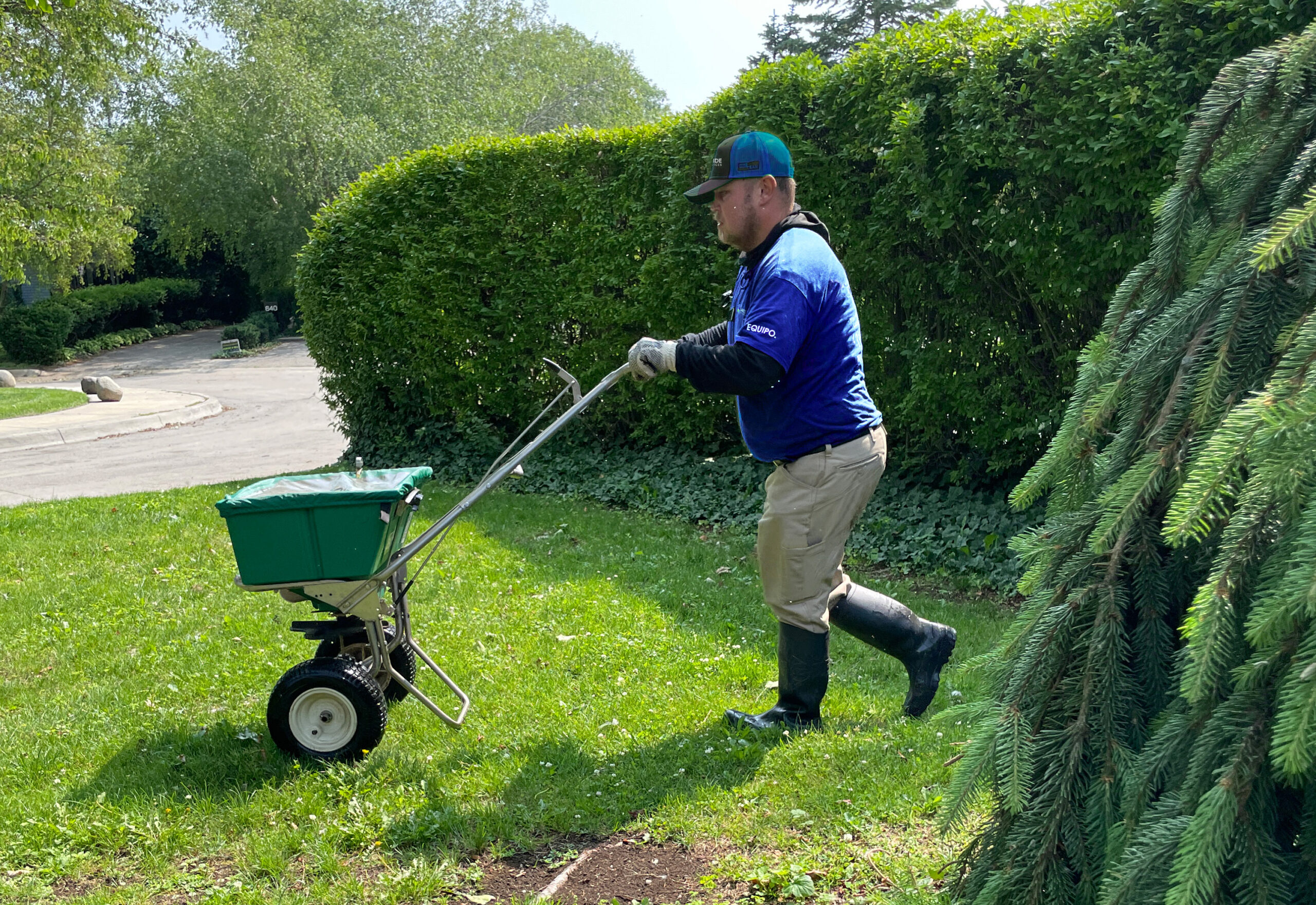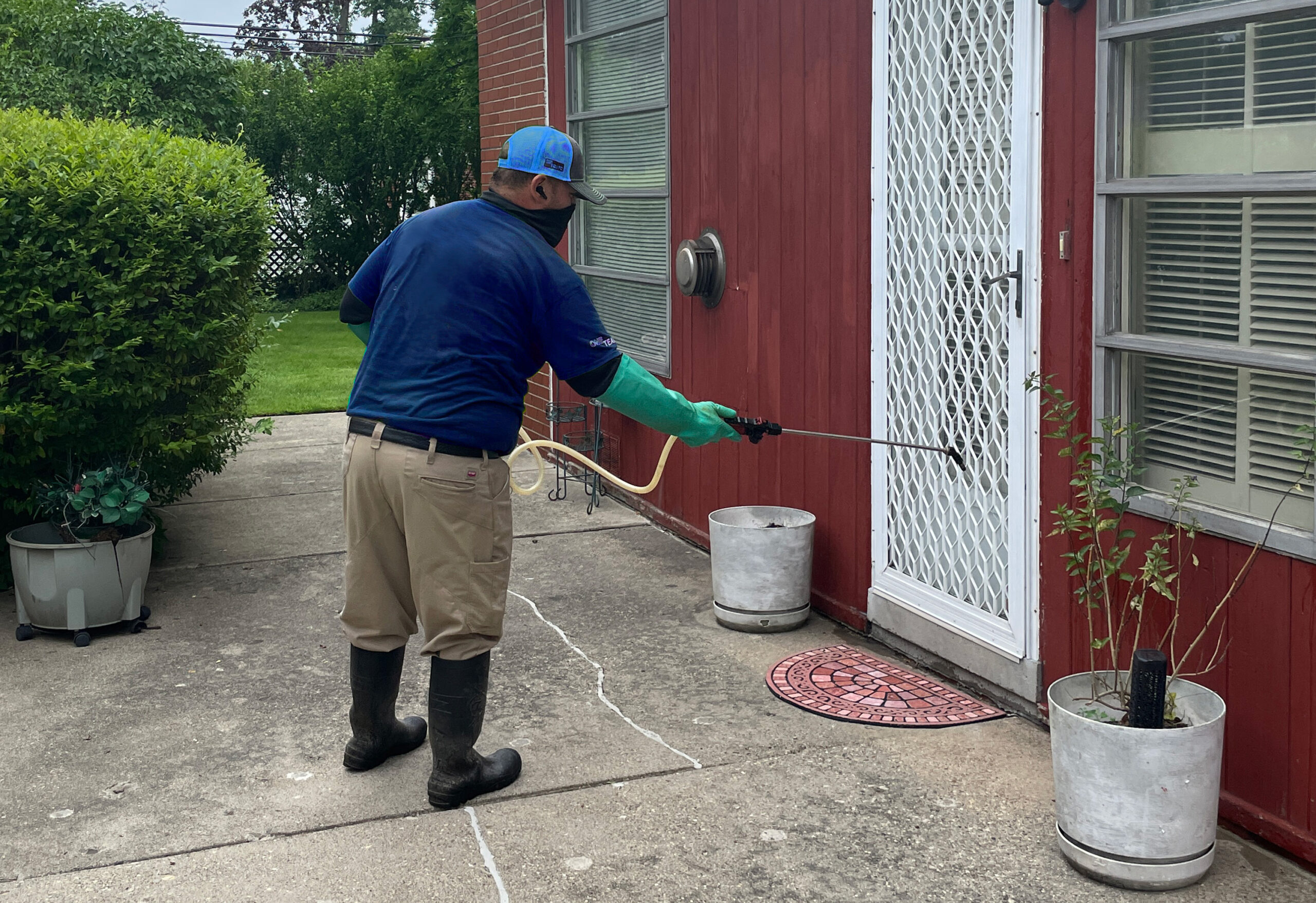Metro Detroit Core Aeration Services
Give your lawn room to breathe. Lakeside Pro Services offers professional core aeration for homes across Metro Detroit — relieving compacted soil, improving root growth, and helping your grass absorb water and nutrients more effectively.
SCHEDULE YOUR SERVICE
Easily set up an appointment with one of our professionals online!
Locally Trusted Aeration Experts in Metro Detroit
Improve Root Growth, Lawn Health, and Soil Performance
If your lawn looks compacted, patchy, or thin — even after watering and fertilizing — the problem may not be what’s on the surface. It’s what’s happening underneath. Over time, soil becomes dense and compressed, making it harder for water, nutrients, and oxygen to reach the roots. That’s where core aeration comes in.
At Lakeside Pro Services, we provide professional core aeration for lawns across Metro Detroit. This process opens up your soil and gives your grass the room it needs to breathe, absorb nutrients, and grow deeper, stronger roots.
Ready to Restore Your Lawn’s Health?
Call us at 586.445.2100 or schedule your core aeration service online today.
What Is Core Aeration?
Core aeration is a mechanical process that removes small plugs of soil and thatch from your lawn using specialized equipment. These small holes reduce soil compaction and allow essential elements — like air, water, and fertilizer — to reach the root zone more effectively.
Unlike spike aeration (which just pokes holes), core aeration physically extracts material from the soil. This creates space for new growth, encourages microbial activity, and breaks down thatch naturally over time. It’s one of the most beneficial, yet underused, lawn treatments for long-term health.
Does Your Lawn Need to be Aerated? Here are the Signs.
Not every lawn needs aeration every year — but many in Metro Detroit do, especially those with heavy clay soil or high foot traffic. Here are some common indicators that your yard could benefit from professional aeration:
Water pooling or running off after rain: If water sits on the surface or quickly runs off instead of soaking in, your soil is likely compacted. This prevents proper hydration and can lead to stressed or shallow-rooted grass.
Thin, patchy, or uneven grass growth: Compacted soil restricts root development, leading to weak, uneven turf coverage. If parts of your lawn seem to grow slower or thinner than others, aeration may be the missing link.
Hard soil that’s difficult to penetrate with a shovel: Try sticking a screwdriver or shovel into your lawn. If it’s difficult to push through, your soil lacks porosity — and roots are likely struggling too.
Excess thatch buildup (½ inch or more): A thick layer of thatch acts like a barrier, keeping water and nutrients from reaching the soil. Aeration helps break down this layer and improves nutrient flow.
Increased weeds or shallow-rooted grass: Weak, shallow-rooted lawns are more susceptible to weed invasions. If your lawn can’t compete with invasive plants, compacted soil may be limiting its ability to establish healthy roots.
Visible foot traffic patterns: If your lawn holds footprints, mower tracks, or appears worn down along pathways, compaction is likely compressing the soil in high-traffic zones.
Spongy or bouncy feel underfoot: A lawn that feels overly soft or springy could be dealing with excess thatch — another indicator that it’s time to aerate and open up the soil.
Poor response to watering or fertilization: If you’re doing everything right — watering regularly, applying fertilizer — and still seeing little improvement, the problem may be that nothing’s reaching the roots.
Grass that dries out quickly after rain: Dry patches that appear soon after rainfall often indicate that water isn’t penetrating — it’s running off compacted soil, leaving roots thirsty.
If your lawn feels spongy or overly firm underfoot, it may be time to schedule a core aeration service.
Call us at 586.445.2100 or schedule your aeration service today.
What to Expect After Your Lawn is Aerated
Once your lawn has been aerated, the real improvement happens below the surface. Here’s what you can expect in the days and weeks following your service:
Visible soil plugs across the lawn: You’ll see small cores of soil left on top of the grass. These plugs are completely normal — they’ll break down naturally over the next 1–2 weeks with rainfall and mowing. They also help reintroduce nutrients and beneficial microbes back into the soil.
Improved water absorption: You may notice that water begins soaking into the lawn more evenly instead of pooling or running off. This is a sign that the soil is finally able to absorb moisture deeper into the root zone.
Stronger, greener growth over time: Within a few weeks — especially when paired with proper watering and fertilization — grass often becomes denser, more vibrant, and better able to resist stress. While the change isn’t instant, the long-term improvement in turf health is noticeable.
Faster recovery with light care: Continue regular mowing and follow watering recommendations. Avoid heavy foot traffic for a few days if the ground is especially soft. If you’ve scheduled overseeding or fertilization with your aeration, those treatments will now be more effective thanks to improved soil access.
Why Michigan Lawns Need Aeration
Lawns across Metro Detroit face a combination of soil and environmental challenges that make core aeration one of the most important treatments for long-term turf health.
Naturally Dense Clay-Rich Soil
Much of the soil in Southeast Michigan — particularly across Wayne, Oakland, and Macomb Counties — is clay-heavy, compactable, and slow to drain. This is especially true in cities like Livonia, where dense subsoil restricts root development, and Southfield, where mature neighborhoods often struggle with years of accumulated compaction. In Sterling Heights and Warren, even newer developments face issues with hardpan soil beneath thin layers of sod.
These conditions prevent water, air, and nutrients from reaching the root zone — no matter how often you water or fertilize. The result is a lawn that stays shallow-rooted, thin, and prone to drought stress or runoff after heavy rain.
Core aeration is the most effective way to correct these conditions. By removing small cores of soil across the lawn, we open up tightly packed areas and allow roots to grow deeper — leading to thicker, more resilient turf that performs better across seasons.
Compacted Lawns from Construction and Traffic
In many Metro Detroit neighborhoods — particularly in newer subdivisions throughout Macomb Township, Novi, and Canton — lawns are often installed over compacted fill left behind during the construction process. This fill is usually low in organic matter and poorly structured, making it difficult for grass to develop strong roots or absorb nutrients efficiently. It may look level and green at first, but over time, these lawns often thin out, dry quickly, and respond poorly to fertilizers or watering.
Even in older areas like Ferndale, Redford, or Dearborn, decades of mowing, foot traffic, and natural settling gradually seal off the soil surface. This limits oxygen flow and traps moisture near the top, preventing it from reaching deeper into the root zone where it’s needed most.
Core aeration is one of the most effective ways to reverse these effects without damaging the lawn. By removing small plugs of soil across the yard, we open up compacted layers, promote healthy structure, and create natural space for air, water, and roots to move freely. It’s a simple but powerful solution to a widespread and often overlooked problem.
Drainage and Shallow Root Problems
Michigan lawns also face wide moisture swings throughout the year — especially in spring and fall, when heavy rains saturate the ground, followed by hot, dry periods during the summer. In areas with compacted or poorly structured soil, that excess water has nowhere to go. Instead of soaking in, it pools on the surface or runs off entirely, leaving grass roots starved for moisture even after a storm.
These cycles create a double burden for lawns: first, waterlogging that stresses the turf and increases disease risk; then, shallow-rooted grass that dries out quickly during hot stretches. Lawns in neighborhoods like Novi, Redford, or Clinton Township often suffer from these symptoms due to underlying clay content and minimal drainage capacity.
Core aeration addresses both problems by creating deeper, more consistent pathways for water to travel through the soil profile. This not only helps reduce runoff and puddling but also encourages roots to grow downward toward moisture-rich zones. Over time, your lawn becomes more drought-tolerant, better equipped to handle heat stress, and less dependent on constant watering.
the Aeration Service Detroit Homeowners Rely On
✓ Licensed & Insured Professionals
Our team uses professional-grade equipment and takes every precaution to protect your lawn, irrigation systems, and surrounding landscape.
✓ Over 30 Years of Experience
We know how to recognize the signs of compaction and apply aeration techniques that actually solve the problem — not just treat the symptoms.
✓ Lawn Health Beyond the Surface
Aeration is just one part of what we do. We offer complete lawn services including fertilization, sod installation, drainage, and more — all working together to improve soil structure and turf growth.
✓ Built for Michigan Soil
From the clay-heavy yards of Livonia and Royal Oak to compacted fill in newer developments around Macomb Township, we tailor every aeration job to local soil conditions.
✓ Reliable, Responsive Service
We show up on time, do the work right, and make sure you know what to expect every step of the way — including how to care for your lawn after aeration.
Choose Lakeside Pro Services for aeration done right — with the equipment, experience, and local knowledge to help your lawn breathe, root deeper, and grow stronger.
Call us at 586.445.2100 or schedule your core aeration service online today.
Other Lawn Care Solutions
lawn Fertilization
Healthy lawns start with the right nutrients. Lakeside Pro Services delivers expert lawn fertilization across Metro Detroit, using tailored treatments that strengthen roots, improve color, and keep your grass thriving season after season.
Pest, Insect, & Mosquito Control
Prevent insects from damaging your landscape and invading your property. Our pros know the proven strategies that can protect your property all season long from pests like mosquitos, fleas, ticks, spiders, and more of what you want to see less of.


